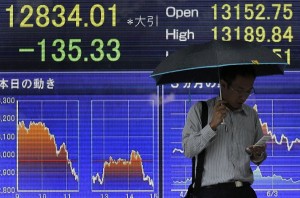Asian shares mostly up on US data, easing China fears

A man checks his mobile phone in front of the electronic stock board of a securities firm in Tokyo Wednesday, June 26, 2013. Asian markets mostly rose Wednesday as dealers welcomed another batch of strong US data while China’s central bank said it had moved to ease a liquidity crisis that has gripped the country’s financial markets. AP PHOTO/ITSUO INOUYE
HONG KONG—Asian markets mostly rose Wednesday as dealers welcomed another batch of strong US data while China’s central bank said it had moved to ease a liquidity crisis that has gripped the country’s financial markets.
Traders breathed a sigh of relief after the People’s Bank of China (PBoC) late Tuesday said it had made money available to some firms in a bid to prevent a cash crunch that had sent shares into a tailspin.
However, Japanese shares gave up initial gains and ended in negative territory as the dollar’s rally against the yen petered out, while Shanghai remained on edge.
Hong Kong added 2.43 percent, or 482.83 points, to end at 20,338.55 while Sydney ended 1.63 percent higher, climbing 75.7 points to 4,731.7, while Seoul rose 0.16 percent, or 2.82 points, to close at 1,783.45.
Philippine stocks led the rally in emerging markets, which have tumbled in recent weeks on expectations of an end to the surge in investment that had been attributed to the US Federal Reserve’s stimulus scheme.
Manila jumped 5.70 percent, or 329.88 points, to 6,118.94, while in the afternoon Jakarta was up 3.72 percent.
However, Tokyo fell 1.04 percent, or 135.33 points, to 12,834.01 and Shanghai lost 0.41 percent, or 8.01 points, to end at 1,951.50.
Mumbai, meanwhile, fell 0.41 percent, or 77.03 points, at 18,552.12 points, as the local rupee tumbled to a fresh lifetime low. The rupee hit 60.51 against the dollar in afternoon trade Wednesday, past its previous record low of 59.98 to the greenback last week.
Capital Securities analyst Jacky Zhang told Dow Jones Newswires: “Investors are worried about financial risks if more problems pop up in the banking system.”
Global markets—already reeling after the Fed last week indicated it would soon begin to wind up its stimulus—have tumbled as China’s lenders were hit by a credit squeeze, stoking concerns for its wider economy.
The PBoC had as recently as Monday ruled out providing fresh cash and ordered banks to put their financial houses in order.
But on Tuesday it said in a statement it had offered funds to some financial institutions in recent days and would continue to do so.
A central bank official said earlier Tuesday that it would “guide market interest rates (that banks charge to lend to each other) into a reasonable range”.
The move came after shares tanked almost six percent in intraday trade on Tuesday, which added to the previous day’s 5.3 percent plunge. Shanghai ended Tuesday just 0.19 percent lower.
Interbank rates surged into double figures late last week but have since eased.
In New York, Wall Street’s three main indexes enjoyed a positive day thanks to data showing more strength and confidence in the US economy and as worries over China abated.
Figures showed new orders for durable goods surged 3.6 percent in May on the back of aircraft sales, while house prices rose a huge 2.5 percent in one month. In addition, the Conference Board’s consumer confidence index jumped to 81.4, up from 74.3 in May.
The Dow rose 0.69 percent, the S&P 500 added 0.95 percent and the Nasdaq was 0.82 percent higher.
While the news will increase expectations the Fed will start to scale back its bond-buying to support the economy, it also shows it is gaining strength.
After weeks of selling in spite of signs of stronger growth, “we may be at a point where good news is good news,” said Art Hogan of Lazard Capital Markets in the US.
The figures also lent support to the dollar in the morning but the unit retreated in the afternoon and it was sitting at 97.45 yen from 97.80 yen in New York late Tuesday. The euro bought $1.3069 and 127.27 yen against $1.3083 and 127.95 yen.
Oil prices fell, with New York’s main contract, West Texas Intermediate light sweet crude for delivery in August, down 74 cents at $94.58 a barrel and Brent North Sea crude for August shedding 47 cents to $100.79.
Gold fetched $1,229.13 per ounce by 1100 GMT, from $1,283.31 late Monday.
In other markets:
— Taipei rose 1.59 percent, or 121.57 points, to 7,784.80.
Hon Hai rose 3.99 percent to Tw$73.0 while Taiwan Semiconductor Manufacturing Company added 0.5 percent to Tw$101.5.
— Wellington finished up 1.77 percent, adding 76.61 points to 4,393.61.
Fletcher Building gained 2.6 percent to NZ$8.41 while Telecom put on 3.4 percent to NZ$2.28 but OceanaGold ended down 10.7 percent at NZ$1.34.
— Bangkok added 2.87 percent, or 39.75 points, to 1,424.38.
Airports of Thailand jumped 10.39 percent to 154 baht, while power firm Electricity Generating rose 6.02 percent to 132 baht.
— Kuala Lumpur rose 12.12 points, or 0.70 percent, to close at 1,740.76.
Genting gained 3.8 percent to 10.30 ringgit while YTL Corp. ended 1.9 percent higher at 1.64. Top Glove lost 2.2 percent to 6.15 ringgit.
— Jakarta ended up 3.82 percent, or 168.86 points, at 4,587.73.
Food manufacturer Indofood Sukses Makmur rose 8.66 percent to 6,900 rupiah, while lender Bank Permata fell 2.37 percent to 1,650 rupiah.
— Singapore was up 0.47 percent, or 14.47 points, to 3,104.40.
United Overseas Bank was down 0.81 percent to Sg$19.49 while oil rig maker Keppel Corp. gained 1.15 percent at Sg$10.54.